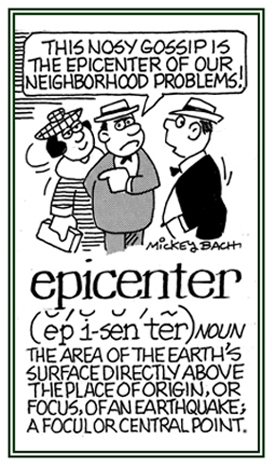epi-, ep-
(Greek: above, over, on, upon; besides; in addition to; toward; among)
The epicardium is the inner layer of the pericardium, a conical sac of fibrous tissue that surrounds the heart and the roots of the great blood vessels.
The pericardium has outer and inner coats. The outer coat is tough and thickened, loosely cloaks the heart, and is attached to the central part of the diaphragm and the back of the sternum (breastbone).
The inner coat is double with one layer closely adherent to the heart while the other one lines the inner surface of the outer coat with the intervening space being filled with fluid.
This small amount of fluid, called the pericardial fluid, acts as a lubricant to allow normal heart movement within the chest.
2. Effeminate; unmanly.
3. Sexless; neuter.
4. In linguistics, having only one form of the noun for both the masculine and the feminine genders.
5. Etymology: from Middle English, having only one form of the noun for either gender, from Latin epicoenus, previously from Greek epikoinos, "in common"; from epi, "on, over, above" + koinois, "common".
2. A main point of something which is normally a difficult or an unpleasant situation: The doctor was at the epicenter of concern about his patient's physical condition.

Go to this Word A Day Revisited Index
so you can see more of Mickey Bach's cartoons.
2. That part of the stem above the cotyledons.
Related "above, over, beyond the normal, excessive" word units: hyper-; super-, supra-, sur; ultra-, ult-.


